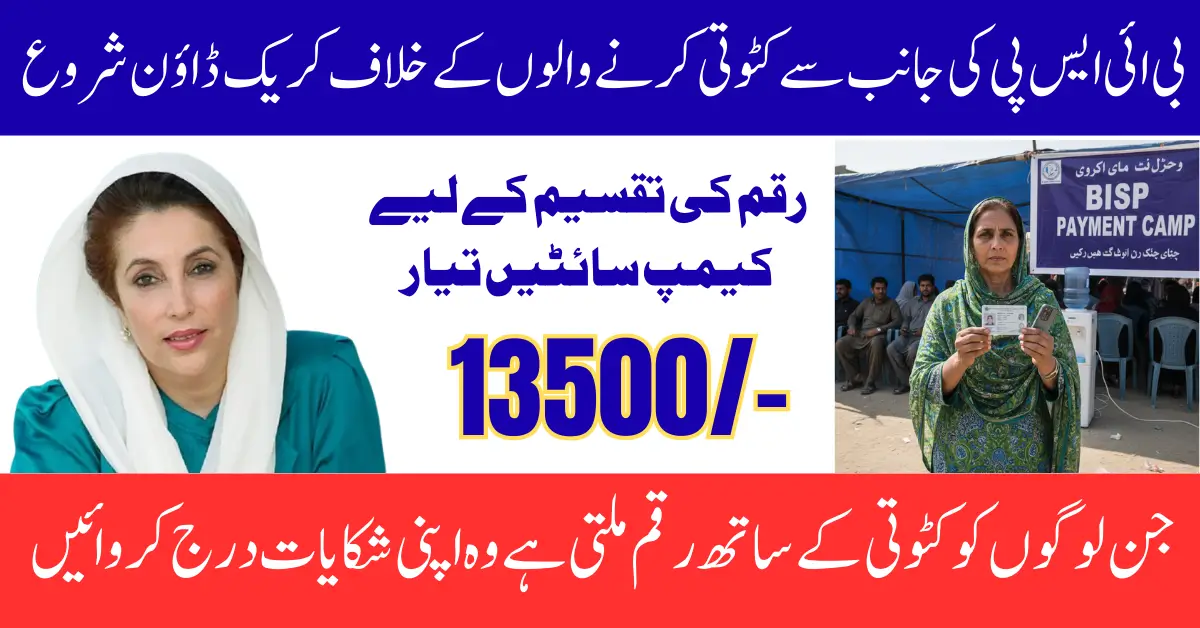BISP Tranche Operations
BISP Tranche Operations has become one of Pakistan’s most important social protection initiatives, designed to assist vulnerable families by providing them with financial support. With the start of every tranche, a large number of beneficiaries depend on timely and transparent disbursement of funds to meet their daily needs. Smooth execution of these tranche operations is therefore a critical responsibility, and to ensure this, Partner Financial Institutions (PFIs) play a central role.

However, experience from past payment cycles has shown that delays, lack of facilities, and poor complaint management have caused difficulties for beneficiaries. To tackle these problems, BISP has introduced stricter enforcement measures. These measures define clear responsibilities for PFIs and impose penalties in case of negligence. Such a framework ensures that not only are funds delivered on time but also that the dignity of beneficiaries is safeguarded during the payment process.
You Can Also Read: CM Punjab Green Credit Program
BISP Schedule of Upcoming Tranche Operations
The payment cycle for Q1 2025-26 will officially begin on 25 September 2025. This tranche will initially cover Clusters 1, 2, and 10, ensuring that beneficiaries in these areas are the first to receive their entitled assistance. Payments will be distributed in phases, and beneficiaries will receive the funds directly through their wallet accounts, which helps in maintaining transparency and reducing the chances of fraud.
To avoid any disruption, BISP has advised all beneficiaries to come prepared when visiting camp sites. They must bring their original CNICs and a mobile phone registered in their name. This will make biometric verification easier and ensure that only the rightful recipients receive the payments. The phased rollout is also a key element of BISP’s strategy because it prevents overcrowding and ensures that operational resources can be better managed.
Phase 1 districts include:
- Rawalpindi, Islamabad, Murree, Attock, Chakwal, Jhelum, Talagang
- Gujarat, Sialkot, Narowal, Mandi Bahauddin, Sargodha, Bhakkar
- Muzaffarabad, Kotli, Mirpur, Hunza, Gilgit, Skardu, Chitral, Swat
- Abbottabad, Haripur, Mansehra, Kohistan, Dir, Battagram, Torghar
- Jacobabad, Naseerabad, Jhal Magsi, Sohbatpur, Qambar Shahdadkot, D.G. Khan, Mardan
You Can Also Read: Benazir Taleemi Wazaif Eligibility Rules Age
PFIs’ Mandatory Responsibilities
Partner Financial Institutions (PFIs) are contractually bound to carry out a number of tasks that directly affect the convenience of beneficiaries. These responsibilities have been designed to ensure that the disbursement process is smooth, efficient, and free from unnecessary difficulties. The most important duty is to guarantee liquidity at all camp sites so that beneficiaries do not face delays in receiving cash.
Another essential responsibility is the provision of basic facilities at the payment locations. Since thousands of people gather at camp sites every day, PFIs must ensure there is shade, clean drinking water, seating arrangements, and visible signboards. Without these facilities, beneficiaries, especially women and elderly citizens, face significant discomfort. Furthermore, PFIs are required to establish a fully functional call center that employs at least 15 agents to handle complaints, queries, and follow-ups in a timely manner.
Key responsibilities include:
- Ensure cash availability and liquidity at every camp site.
- Provide shade, water, seating arrangements, and signboards.
- Set up a dedicated call center with at least 15 agents.
Penalty Rules for BISP Non-Compliance
To make sure these duties are not ignored, BISP has set clear penalties for any negligence by PFIs. The penalties are structured in a way that holds PFIs accountable on a daily basis, which motivates them to remain consistent in their service. For example, if liquidity is not available at camp sites, the concerned PFI will face a penalty of Rs. 10,000 per day.
Similarly, failure to provide essential facilities such as shade, drinking water, seating, or signboards will lead to a fine of Rs. 50,000 for every violation. This amount is high enough to ensure seriousness in compliance. Lastly, if a PFI fails to operate a call center with the required 15 agents, it will be fined Rs. 25,000 per day. These rules highlight BISP’s determination to enforce discipline and maintain the dignity of beneficiaries.
You Can Also Read: Punjab E-Taxi Scheme 2025 Details Zero Markup
PFIs Responsibilities and Penalties
| Responsibility | Penalty |
|---|---|
| Ensure liquidity at camp sites | Rs. 10,000 per day |
| Provide shade, water, seating, and signboards | Rs. 50,000 per violation |
| Establish call center with 15 agents | Rs. 25,000 per day |
Issues in Reporting and Complaint Management
Despite these rules, challenges remain in the reporting and monitoring system. A common issue observed is that complaints from beneficiaries are often shared via WhatsApp or email rather than being properly logged into the Payment Complaint Management System (PCMS). When complaints are not officially recorded, penalties cannot be imposed, and PFIs escape accountability.
This loophole not only delays the resolution of complaints but also undermines the credibility of the monitoring process. Many beneficiaries feel discouraged when their issues remain unresolved, which reduces trust in the system. BISP has therefore made it a priority to ensure that every single complaint is entered into PCMS so that penalties can be enforced where necessary. Only then can transparency and accountability be truly guaranteed.
Instructions for Enforcement and Monitoring
To strengthen oversight, BISP has issued a series of instructions for its field and regional offices. The FO Section and Regional Offices must ensure that all Assistant Directors (ADs) and Deputy Directors (DDs) upload daily reports into PCMS without fail. In case they neglect this responsibility, disciplinary action will be taken against them.
The FO Section has also been directed to formally remind PFIs about their responsibilities. A one-page summary will be prepared for monitoring officers so that they can quickly identify whether PFIs are meeting their obligations. Additionally, the E&GR Section will verify that each PFI has set up a call center with at least 15 agents and is maintaining proper records of complaints. This three-layered monitoring system ensures that responsibilities are not just defined but actively enforced.
You Can Also Read: BISP Wallet Accounts Payment Transfer
Key enforcement instructions:
- ADs and DDs must submit daily reports in PCMS.
- FO Section will send written reminders to PFIs.
- E&GR Section will verify call centers and complaint records.
Oversight and Approval
The enforcement framework has been issued with the approval of the Director General (CT), which means it carries the highest level of authority within BISP’s operational structure. The document has been formally signed by Muhammad Irfan Rafiq, Director (Payment/Reconciliation), BISP Islamabad.
This official approval is a strong indicator that the government is serious about ensuring the success of tranche operations. By centralizing oversight and holding PFIs accountable through penalties, BISP aims to strengthen beneficiary confidence. It also demonstrates that public funds are being protected through strict monitoring and transparency.
You Can Also Read: AZAG Registration Alert Check District Offices
Conclusion
The enforcement of PFIs’ contractual obligations is a major step toward making BISP’s tranche operations more efficient, transparent, and beneficiary-friendly. By defining clear responsibilities and linking them to financial penalties, BISP is ensuring that negligence is minimized and beneficiaries receive their payments with dignity.
The success of this system now depends on strict monitoring, proper complaint logging, and consistent enforcement of penalties. If these elements are fully implemented, the overall payment process will become smoother and more reliable. For the millions of families relying on this assistance, such improvements bring a sense of trust and stability in the government’s efforts to support the poor.
You Can Also Read: BISP 8171 Portal Re-Launch September 2025


